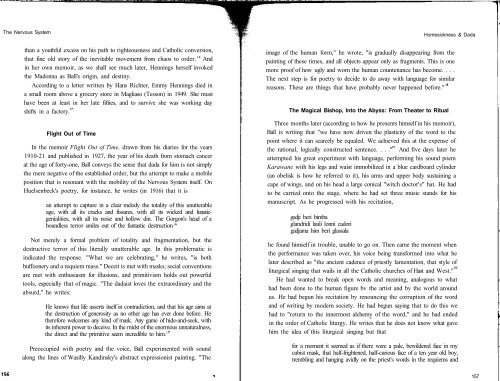The Nervous System - Department of English and Comparative ...
The Nervous System - Department of English and Comparative ...
The Nervous System - Department of English and Comparative ...
Create successful ePaper yourself
Turn your PDF publications into a flip-book with our unique Google optimized e-Paper software.
<strong>The</strong> <strong>Nervous</strong> <strong>System</strong><br />
than a youthful excess on his path to righteousness <strong>and</strong> Catholic conversion,<br />
that fine old story <strong>of</strong> the inevitable movement from chaos to order. And<br />
in her own memoir, as we shall see much later, Hennings herself invoked<br />
the Madonna as Ball's origin, <strong>and</strong> destiny.<br />
According to a letter written by Hans Richter, Emmy Hennings died in<br />
a small room above a grocery store in Magliaso (Tesson) in 1949. She must<br />
have been at least in her late fifties, <strong>and</strong> to survive she was working day<br />
shifts in a factory.<br />
Flight Out <strong>of</strong> Time<br />
In the memoir Flight Out <strong>of</strong> Time, drawn from his diaries for the vears<br />
1910-21 <strong>and</strong> published in 1927, the year <strong>of</strong> his death from stomach cancer<br />
at the age <strong>of</strong> forty-one, Ball conveys the sense that dada for him is not simply<br />
the mere negative <strong>of</strong> the established order, but the attempt to make a mobile<br />
position that is resonant with the mobility <strong>of</strong> the <strong>Nervous</strong> <strong>System</strong> itself. On<br />
Huelsenbeck's poetry, for instance, he writes (in 1916) that it is<br />
an attempt to capture in a clear melody the totality <strong>of</strong> this unutterable<br />
age, with all its cracks <strong>and</strong> fissures, with all its wicked <strong>and</strong> lunaticgenialities,<br />
with all its noise <strong>and</strong> hollow din. <strong>The</strong> Gorgon's head <strong>of</strong> a<br />
boundless terror smiles out <strong>of</strong> the fantastic destruction<br />
Not merely a formal problem <strong>of</strong> totality <strong>and</strong> fragmentation, but the<br />
destructive terror <strong>of</strong> this literally unutterable age. In this problematic is<br />
indicated the response. "What we are celebrating," he writes, "is both<br />
buffoonery <strong>and</strong> a requiem mass." Deceit is met with masks; social conventions<br />
are met with enthusiasm for illusions, <strong>and</strong> primitivism holds out powerful<br />
tools, especially that <strong>of</strong> magic. "<strong>The</strong> dadaist loves the extraordinary <strong>and</strong> the<br />
absurd," he writes:<br />
He knows that life asserts itself in contradiction, <strong>and</strong> that his age aims at<br />
the destruction <strong>of</strong> generosity as no other age has ever done before. He<br />
therefore welcomes any kind <strong>of</strong> mask. Any game <strong>of</strong> hide-<strong>and</strong>-seek, with<br />
its inherent power to deceive. In the midst <strong>of</strong> the enormous unnaturalness,<br />
the direct <strong>and</strong> the primitive seem incredible to him.<br />
Preoccupied with poetry <strong>and</strong> the voice, Ball experimented with sound<br />
along the lines <strong>of</strong> Wasilly K<strong>and</strong>insky's abstract expressionist painting. "<strong>The</strong><br />
Homesickness & Dada<br />
image <strong>of</strong> the human form," he wrote, "is gradually disappearing from the<br />
painting <strong>of</strong> these times, <strong>and</strong> all objects appear only as fragments. This is one<br />
more pro<strong>of</strong> <strong>of</strong> how ugly <strong>and</strong> worn the human countenance has become. . . .<br />
<strong>The</strong> next step is for poetry to decide to do away with language for similar<br />
reasons. <strong>The</strong>se are things that have probably never happened before."<br />
<strong>The</strong> Magical Bishop, Into the Abyss: From <strong>The</strong>ater to Ritual<br />
Three months later (according to how he presents himself in his memoir),<br />
Ball is writing that "we have now driven the plasticity <strong>of</strong> the word to the<br />
point where it can scarcely be equaled. We achieved this at the expense <strong>of</strong><br />
the rational, logically constructed sentence. . . ." And five days later he<br />
attempted his great experiment with language, performing his sound poem<br />
Karawane with his legs <strong>and</strong> waist immobilized in a blue cardboard cylinder<br />
(an obelisk is how he referred to it), his arms <strong>and</strong> upper body sustaining a<br />
cape <strong>of</strong> wings, <strong>and</strong> on his head a large conical "witch doctor's" hat. He had<br />
to be carried onto the stage, where he had set three music st<strong>and</strong>s for his<br />
manuscript. As he progressed with his recitation,<br />
gadji beri bimba<br />
gl<strong>and</strong>ridi lauli lonni cadori<br />
gadjama him beri glassala<br />
he found himself in trouble, unable to go on. <strong>The</strong>n came the moment when<br />
the performance was taken over, his voice being transformed into what he<br />
later described as "the ancient cadence <strong>of</strong> priestly lamentation, that style <strong>of</strong><br />
liturgical singing that wails in all the Catholic churches <strong>of</strong> Hast <strong>and</strong> West."<br />
He had wanted to break open words <strong>and</strong> meaning, analogous to what<br />
had been done to the human figure bv the artist <strong>and</strong> bv the world around<br />
us. He had begun his recitation by renouncing the corruption <strong>of</strong> the word<br />
<strong>and</strong> <strong>of</strong> writing by modern society. He had begun saying that to do this we<br />
had to "return to the innermost alchemy <strong>of</strong> the word," <strong>and</strong> he had ended<br />
in the order <strong>of</strong> Catholic liturgy. He writes that he does not know what gave<br />
him the idea <strong>of</strong> this liturgical singing but that<br />
for a moment it seemed as if there were a pale, bewildered face in my<br />
cubist mask, that half-frightened, half-curious face <strong>of</strong> a ten year old boy,<br />
trembling <strong>and</strong> hanging avidly on the priest's words in the requiems <strong>and</strong><br />
157
















